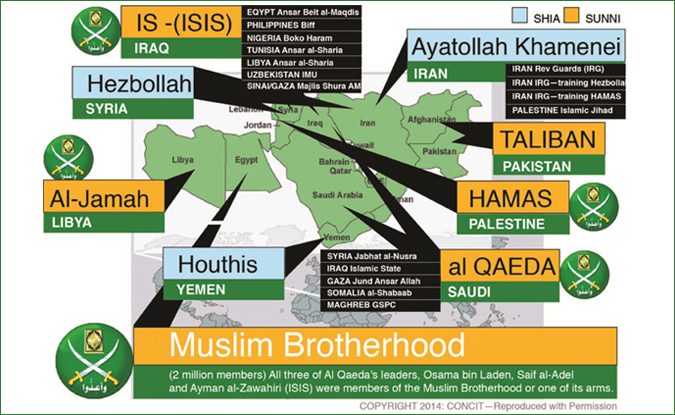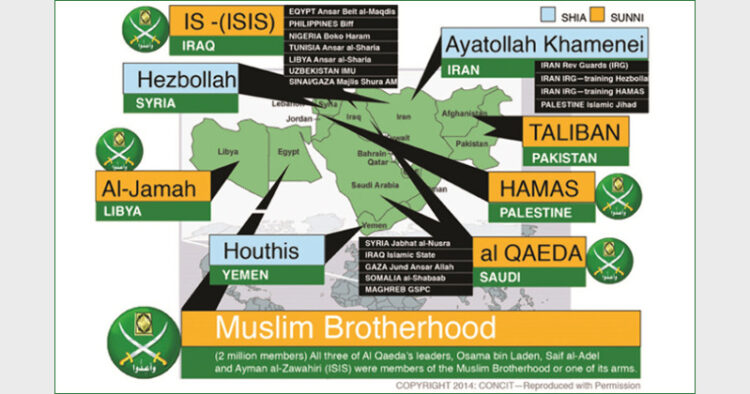Now when radical Islam stands as a serious threat for peace of the world, some politicians compare it to patriotic nationalist organisations due to their poor general knowledge, which is utterly malicious and unfortunate

On August 28, an Egyptian court sentenced six people to death for their roles in a 2016 terrorist attack on a security checkpoint north of Cairo killing a policeman. All were charged with “establishing a terrorist group” and attack on security forces. Egypt has cracked down on suspected Islamists since the military ousted an elected but divisive Islamist president Mohammad Morsi, a leader of Freedom and Justice Party, a political offshoot of the Muslim Brotherhood, in 2013. Since then, hundreds of Islamists, including Muslim Brotherhood members, have been sentenced to death. As a Pan-Islamic, religious, and social movement, Muslim Brotherhood whose stated goal is to instill the Quran and the Sunnah as the “sole reference point for … ordering the life of the Muslim family, individual, community … and state”, but this organisation has moved far beyond mere educating the people.
The Society of the Muslim Brothers better known as ‘Muslim Brotherhood’ or al-Ikhw?n al-Muslim?n, is a transnational Sunni Islamist organisation founded in Egypt by Islamic scholar and schoolteacher Hassan al-Banna in 1928. But Muslim Brotherhood’s main ideologue was Sayyid Qutb. He, who by profession a teacher and civil servant, set out the basic doctrines of radical Sunni Islamism, mostly written in jails in the 1960s under President Gamal Abdul Nasser regime. Qutb believed that Muslims were living in ‘jahiliyya’, the state of ignorance and barbarism that existed in Arabia before the advent of Islam. It had to be fought just as the Prophet Muhammad had fought the pagans. (This is clearly seen in their behaviour towards the non-Muslims and it is quite fanatic. For instance, in 1997 Muslim Brotherhood Supreme Guide Mustafa Mashhur told journalist Khalid Daoud that he thought Egypt’s Coptic Christians and Orthodox Jews should pay the long-abandoned jizya poll tax)
• Egyptian authorities have seized at least $34 million in assets of the Muslim Brotherhood members since 2013.
• In September 2013, an Egyptian court banned the activities of the decades-old Muslim Brotherhood, the group from which ousted President Mohamed Morsi hails. The court had also ordered the group’s dissolution and the confiscation of its offices and funds.
• In December 2013, the government declared the Brotherhood a “terrorist” group, blaming it for a spate of deadly attacks on security personnel.
• In September 2013, an Egyptian court banned the activities of the decades-old Muslim Brotherhood, the group from which ousted President Mohamed Morsi hails. The court had also ordered the group’s dissolution and the confiscation of its offices and funds.
• In December 2013, the government declared the Brotherhood a “terrorist” group, blaming it for a spate of deadly attacks on security personnel.
Qutb believed that humanity had a choice between jahiliyya and Islam. He also believed there could be no middle ground between the two—that Islam represented God while jahiliyya represented Satan. Years later, Osama bin Laden would look to Qutb’s views in order to justify al-Qaeda’s violent attacks as a defence against the enemies of Islam, chief among them, the United States (9/11Commission Report). The corollary was that Muslims who did not subscribe to Qutb’s notion of an Islamist ‘vanguard’ could be declared unbelievers, or kafir.
Saudi Arabia’s petro-dollars, which gave Islamists the means to proselytise around the Muslim world; and Ayatollah Khomeini’s Islamic revolution which overthrew the Shah of Iran in 1979, provided necessary encouragement for the rapid spread of an ideology. Principles
Main principle of Brotherhood is introduction of the Islamic Sharia as “the basis for controlling the affairs of state and society” and secondly, working to unify “Islamic countries and states, mainly among the Arab states, and liberate them from foreign imperialism”. Muslim Brotherhood founder Hassan al-Bana rejected the nation-states created after the fall of the Ottoman Empire. He instead advocated pan-Arab nationalism and the creation of a single Islamic caliphate similar as ISIS. The Brotherhood’s “most frequently used slogan” is “Islam is the Solution” and “Islam is our Constitution” narrated the whole story.
Share Ideological Backgrounds
As the progenitor of the modern Islamist movement, the Muslim Brotherhood has had a profound influence on the belief system that fuels al-Qaeda and ISIS. These groups share ideological underpinnings based on the writings of the late Brotherhood ideologue Sayyid Qutb. The Brotherhood has also served as a bridge for young Islamists—including bin Laden, al-Baghdadi, and al-Zawahiri—to more violent jihadist groups. Although their execution strategies may differ, at their core, all three groups maintain a shared Islamist vision of establishing a global caliphate, as was the ideology of Banna and Qutub.
Officially, the Brotherhood adheres to a non-jihadist form of Salafism and maintains a public stance of non-violence, a position adopted by the main Egyptian branch in the 1970s in exchange for permission to organise politically in Egypt. Despite this official position, the Brotherhood has nonetheless supported the violent policies of its Palestinian offshoot, Hamas. The Brotherhood has also been linked to violence in Egypt since the 2013 fall of the Brotherhood-led government there. Recruiters to violent Islamist groups also frequently use Brotherhood literature and ideology as a part of its religious indoctrination program for potential recruits, who then easily transition to overtly violent jihadist groups like al-Qaeda and ISIS.
While the Brotherhood and ISIS have traded accusations amid disagreements on tactics and strategy, elements within each group have found common ground and readily cooperate logistically and in other ways. Some Egyptian observers see clear evidence that younger Brotherhood members are increasingly turning to violence in the face of government crackdowns on their organisation. They point to violent raids and former president Mohammed Morsi’s death sentence as sending the message that the group’s anti-violence stance is ineffective.
Terrorist Activities
The Brotherhood is banned as a terrorist organisation in many countries especially in Arab world too, like Saudi Arabia, the UAE and Egypt. Muslim Brotherhood has been associated with many terrorist incidents in past. The 1993 lorry bombing of the World Trade Centre, carried out by followers of the blind Egyptian Sheikh, Omar Abdel Rahman who was very much in relation to Muslim Brotherhood. U.S. authorities arrested Mohammad Jamal Khalifa in 1994 in connection with the 1993 World Trade Center bombing. He was also a senior Brotherhood leader, according to the U.S. Government. He later operated a charity in the Philippines that allegedly funneled money to the Abu Sayyaf Group and also laundered money for bin Laden. He was killed in 2007.
Brotherhood members in Libya have reportedly joined ISIS and al-Qaeda training camps. According to a January 2016 news report, young members of the Brotherhood receive between $150 and $250 per day to take part in the Libyan training camps. The Brotherhood’s role as a bridge to jihadist organisations is perhaps most visible in the group’s ties to al-Qaeda. The United States sanctioned Sheikh Abd al-Majeed al-Zindani in 2004, for example, for a “long history of working with bin Laden, serving as one of his spiritual leaders.” Al-Zindani also led the Brotherhood’s al-Islah political party in Yemen. The Brotherhood also supported the 1988 creation of Bank Al Taqwa in the Bahamas. The US Government revealed that the bank was a shell company that supported terrorist groups such as Hamas, the Islamic Salvation Front, and al-Qaeda.
Mohammed Badie, the Brotherhood’s supreme spiritual guide, gave a 2010 sermon that paralleled the 1996 al-Qaeda declaration targeting the West. Specifically, Badie declared that resistance through “jihad and sacrifice and by raising a jihadi generation that pursues death just as the enemies pursue life” is the “only solution against the Zio-American arrogance and tyranny.”
These examples led to the November 2015 introduction of the Muslim Brotherhood Terrorist Designation Act in both Houses of US Congress. The bill called for the United States to designate the Brotherhood as a terrorist organisation and listed former Brotherhood members who went on to join al-Qaeda and were later designated as terrorists by the United States.
Testimonials worldwide
In July 2017, Bahrain’s Foreign Minister Khalid bin Ahmed al-Khalifa has called the Muslim Brotherhood movement a ‘terrorist’ group. Khalid bin Ahmed said that the Muslim Brotherhood movement ‘shed the blood’ of Egyptian people and had ‘conspired against our states’. In February 2003, the Supreme Court of Russia banned the Muslim Brotherhood, labelling it as a terrorist organisation, and accusing the group of supporting Islamist rebels who want to create an Islamic state in the North Caucasus. In January 2017, during his confirmation hearing, the former US Secretary of State, Rex Tillerson, referred to the Muslim Brotherhood, along with Al-Qaeda, as an agent of radical Islam.
Relations with Terror Outfits
The most notorious former Brotherhood member to join al-Qaeda is the group’s co-founder, Osama bin Laden who belonged to the Brotherhood’s chapter in the Arabian Peninsula, according to al-Qaeda co-founder Ayman al-Zawahiri. Several of al-Qaeda’s most famous leaders have also passed through the Brotherhood. Ayman al-Zawahiri co-founded al-Qaeda with Osama bin Laden in 1988. Years earlier, he had joined the then-outlawed Brotherhood as a teenager in Egypt, for which he was arrested at age 15. Al-Zawahiri went on to join the Egyptian Islamic Jihad (EIJ) in 1973. The Brotherhood had a profound influence on al-Qaeda operative and 9/11 mastermind Khalid Sheikh Mohammed, and his nephew Ramji yousef, according to a 2011 profile in the New Yorker.
In January 2016, the London-based Arab newspaper ‘Asharq al Awsat’ reported that ISIS, al-Qaeda, and the Muslim Brotherhood were discussing the formation of a joint shura (leadership) council in Libya, according to leaked document obtained by the newspaper. The paper reported that the discussions of an alliance are because the groups want to send a message of joint opposition from Libya’s Islamists to the Libyan unity government.
Brotherhood members in Libya have reportedly received daily salaries for joining ISIS and al-Qaeda training camps. Al-Qaeda has also reached out to the Brotherhood. Leaders of both groups reportedly held meetings in October 2013 in Jordan.
Today the stark reality of Muslim Brotherhood is clearly visible before the world, but at the same time there are many policymakers and politicians who deliberately ignore it because of their pity interests. Nowadays, when radical Islam stands as a serious threat for peace of the world, some political persons compare it to patriotic nationalist organisations due to their weak common knowledge, which is utterly malicious and unfortunate.
(The writer is a researcher and regularly observes global media)














Comments